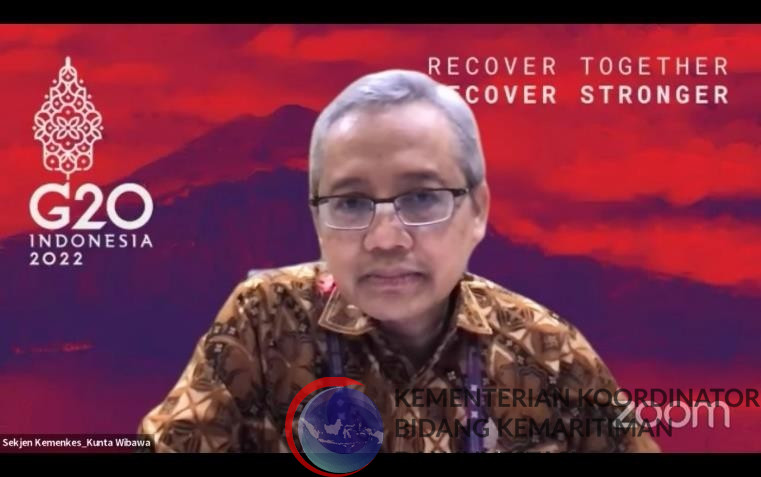G20 Health Ministers Agree on Health Protocols Harmonization

PRESS RELEASE NO.48/SP/TKMG20/11/2022
G20 COMMUNICATIONS AND MEDIA TEAM
Marves -Nusa Dua, November 12, 2022 – G20 member countries support and encourage the creation of a health protocol harmonization network connected among countries. This inter-state network connection is raised to become one of the main talking points at the G20 Summit in Bali on Nov. 15—16 in addition to the agreement to launch a "pandemic fund".
This harmonization of health protocols will bridge countries, especially G20 members, to connect, especially regarding people mobilization during the pandemic in a safer manner to accelerate economic recovery. This is the result of the 2nd G20 Health Ministerial Meeting in October.
“This harmonization is in the form of travel certificates collaboration for people traveling overseas. If another pandemic (similar to COVID-19) occurs, the country will no longer need to impose a regional quarantine or lockdown. Healthy people can still travel, while those who are sick cannot," said Health Ministry’s Secretary General Kunta Wibawa Dasa Nugraha at the #G20updates press conference, Friday, Nov. 11.
Kunta explained that the interconnection of health protocols through applications from other countries is useful for controlling healthy people’s mobilization during their travel. Therefore, when the world faces a pandemic in the future, people can still travel so that the economy continues to run.
From the last pandemic, he continued, several countries issued lockdown policies. Many healthy people cannot carry out their activities, including traveling abroad, resulting in the economy's collapse.
According to Kunta, harmonizing the standards of global health is very useful in helping the world to control the negative impact of future health emergencies. The countries who agree to integrate the connection need to exchange data and recognize each other's digital applications.
With the exchange of data, only unhealthy people are prohibited from traveling. Meanwhile, healthy people are still allowed to carry out activities outside so the economy can continue running.
Kunta also gave an example. If an Indonesian goes to Japan, then the official in that country simply needs to transfer the PeduliLindungi application (owned by Indonesia) and no longer needs to download the application from the destination country (Japan) and vice versa, when other foreign citizens come to Indonesia.
Research collaboration
One of the other key actions agreed upon at the 2nd G20 Health Ministers Meeting last October was about the plan after the completion of the Access to COVID-19 Tools-Accelerator (ACT-A) evaluation.
The G20 countries shall continue to be the leaders in building successor entities and functions to ensure the readiness in responding to another pandemic in the future.
Interdisciplinary and cross-country collaboration is needed to guarantee the prevention, preparedness, and response to future pandemics. This kind of collaboration requires capacity building, scientific partnership, and knowledge-sharing.
Kunta also emphasized the importance of building and strengthening a collaborative network of scientists in the field of public health emergencies.
He went on by saying that Indonesia’s G20 Presidency underlined the importance of surveillance, especially on genomics using the One Health approach.
G20 countries support the timely exchange of pathogen data on a trustworthy platform. Indonesia initiates the Biomedical and Genome Science Initiative (BGS-i) to support better genomics surveillance in the future.
The first Health Working Group meeting discussed the relevance of shared standards to ensure a smooth journey with mutual recognition of vaccination certificates and interoperability as well as digital applications. Many countries have agreed upon the proposal and are currently exploring the best approach to meet this need by conducting a series of virtual trials of technology due diligence, to establish a Federated Public Trust Directory for digital COVID-19 certificates.
At that time, Indonesia was selected as one of the recipients of WHO mRNA manufacturing. Following up on this, Indonesia and South Africa through Bio Farma and Afrigen developed cooperation in the production of an mRNA-based COVID-19 vaccine and the WHO vaccine hub network.
Indonesia is in the process of developing a vaccine research and manufacturing center and identifying potential partners to build vaccine research and manufacturing capacity, with a national producer partnership scheme.
In the 2nd G20 Health Ministers Meeting, G20 member countries also agreed to carry out a gap analysis and research network mapping as well as the development of existing and progressing manufactures as an initial step to expand research and production capacity for vaccines, therapeutics, and diagnostics (VTD). As a result of the discussion, there were seven G20 member countries interested in this effort, namely Argentina, Brazil, India, Indonesia, Saudi Arabia, Turkïye, and South Africa.
About #G20Updates:
G20 Updates consists of routine press conferences, press releases, infographics, and videos produced by G20 Communications and Media Team. It is aimed to provide comprehensive information regarding preparations and issues related to G20 Summit held in Bali, Indonesia on November 15-16, 2022.
Contact person :
Director General of Public Information and Communications of the Ministry of Communications and Informatics – Usman Kansong (0816785320).
Get more information at https://infopublik.id/categories/g20